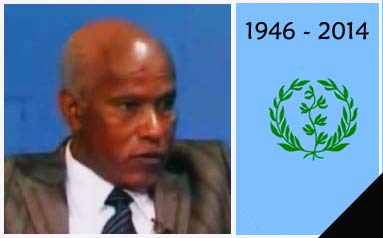Sudan, UNHCR Intimidated By Asmara; Eritrean Refugees Suffer

Last week, Sudan rounded up and jailed 93 (ninety-three) Eritrean refugees, including eight underage females, from the border town of Kassala and environs.
Sudan is targeting around twelve of them for deportation to Eritrea. AlSharq, a legal aid group, is attempting to represent the jailed Eritreans. Some attorneys are hesitant to take up their case given the close ties the Eritrean regime has developed with Sudan’s security forces.
Eritrean activists in Sudan and elsewhere have reached out to the United Nations High Commissioner for Refugees (UNHCR).
Eritrea and Sudan, along with much of the rest of the world, are signatories to the 1951 Convention and the 1967 Protocol to the United Nations Convention Relating to the Status of Refugees. This, among other things, compels them to respect article (Article 33)(1) against non-refoulement: forcibly returning refugees to the land they escaped, a land where they face persecution.
Approximately a thousand Eritreans migrate to Sudan and Ethiopia every month to avoid the indefinite military conscription and total absence of civil liberties in Eritrea.
Since 2001, 81,421 Eritreans (aged 13 to 35) have crossed to Sudan but more than twice that number are not accounted for since many blend in the society or disperse in the many Sudanese villages, towns and cities.
Out of the 81,421 refugees, only 29,804 were screened by refugee authorities and carry ID cards; the rest are either in the process of screening or have disappeared or mover to other countries. The number of underage children is 4,473, around 50% of whom are not screened.
Tens of thousands of Eritreans have crossed to Ethiopia and are settled in refugee camps, which are overflowing , forcing the Ethiopians to open new camps.
On July 25, two Eritreans, a 17-year old and a 23-year old who were being forcibly returned by Sudan, jumped off the truck returning them. The 23-year old died and the 17-year old was injured and was unconscious when the UNHCR issued a statement condemning Sudan. http://www.unhcr.org/4e2ec8a36.html
The Eritreans have solid reasons for taking extreme measures to avoid return to Eritrea: most of them are treated like military deserters and a harsh punishment of detention at the desert concentration camp of WiA, forced labor and solitary confinement awaits them.
In June 2008, the regime of Hosni Mubarek forcibly returned almost 1,000 Eritreans, using 9 daily flights from Cairo to Massawa. Each Egypt Air flight was accompanied by 30-40 Egyptian security officers, perhaps to avoid a repeat of earlier flight that was forcibly landed in Sudan by combative Eritreans who were being refouled by the regime of Moammer Gaddaffi. The returnees were sent to WiA, a desert concentration camp. The Eritrean state media produced a propaganda piece interviewing some of the forcibly returned Eritreans who expressed remorse at leaving the “motherland” because they were tricked and the Eritrean regime spoke of how each of the returnee was given a stipend and returned to his home. Wikileaks follows up:
On What Happened To The Forcibly Returned
Post received a reliable report on the fate of the approximately 900 Eritreans deported from Egypt in June. About 80% (720) of the prisoners were military deserters, who were returned to their units after a couple of weeks of processing. Another 30 to 50 deportees were considered “criminals” and remain either in the Wia disciplinary camp (where all of the deportees were initially taken) or in one of Eritrea’s other prisons. Post’s source, whose close relative works as an administrator at Wia, corroborated Eritrean media reports that the GSE threw a party for the remaining 130 to 150 returnees, provided a 500 Nakfa ($33) cash payment to each person, and allowed them to return home almost immediately.
It should be noted here that nothing good comes out from Eritreans “returned to their units.” Each military commander has unlimited powers to imprison, torture or summarily execute or, if female, treat as concubine, anybody that is assigned to his “care.” Most of the horrendous torture techniques—“helicopter”, “Jesus Christ”, “container”, etc which have been documented by human rights organizations–were invented by the sadistic military commanders.
Why Massawa Airport Was Chosen Over Asmara Airport
Landing the deportation flights in Massawa rather than Asmara is most likely an attempt to maintain secrecy. Asmara’s airport is close to the city with only a few flights per day. The arrival of an off-schedule flight would likely attract attention, as would buses loaded with deportees traversing the length of Asmara toward Massawa enroute to W’ia. Massawa’s airport does not host commercial passenger traffic, providing enhanced operational security. The airport is located approximately seven miles from the city, protected by a road checkpoint five miles away. Massawa is a small city with very little vehicle traffic, especially after dark, and roads from the airport toward W’ia bypass the center of town.
What Is WiA Like?
Deportees face incredible hardships after arriving in Eritrea. W’ia, their likely destination, is a desert detention facility south of Massawa holding large numbers of national service evaders and individuals caught attempting to illegally leave Eritrea. It is reportedly similar to a concentration camp, with hundreds of prisoners herded nightly into a small bivouac area with no facilities. Those found to have evaded national service or deserted the military potentially face severe physical punishments. Other prisoners face lengthy incarceration.
UNHCR Asmara’s Fear And Trepidation of the PFDJ
PolOff met with UNHCR representative Alvin Gonzaga (protect) on July 7 to discuss the status of the deportees. Gonzaga presented little useful information, in what is becoming an unfortunate pattern with the UNHCR in Asmara. He stated the prevailing rumor is that the returnees who had previously completed national service requirements have been returned to their homes while those who still had service to complete were returned to their military units. Although Gonzaga previously mentioned the UNHCR Cairo office holds a master list of Eritrean refugees in Egypt, he expressed concern over the safety of the deportees’ families and has reportedly instructed the Cairo office to hold on to the list rather than to attempt to verify whether the Eritreans have actually been returned home. Gonzaga also was unsure of exactly how many returnees there were, quoting previously reported estimates of between 400 and 1,400.
Sudan’s Complicity
Ever since the Eritrean regime normalized its relationship with Sudan’s Al Bashir regime, Sudanese authorities have been forcefully returning refugees to Eritrea. After the Eritrean regime demonstrated to the Omar Albashir regime that it is capable of opening battles in three fronts (Darfur, South Sudan and East Sudan), Sudan, particularly East Sudan, has become the playground of Isaias Afwerki. Sudanese security are not only corrupt; their corruption price is relatively cheap: the security officers accompanying the deported refugees are received warmly by the Eritrean regime and offered lavish parties including women and drinks, something the Sudanese officers consider a paid vacation.
According to wikileaks:
The Eritrean embassy in Khartoum monitors Eritreans in Sudan, according to UNHCR. High-profile Eritrean refugees, such as those who are politically involved, are allegedly tracked and targeted by Sudan’s National Intelligence and Security Service (NISS) in coordination with GSE [awate clarification: GSE stands for Government of State of Eritrea] counterparts. The targeted Eritreans are then detained in NISS holding cells where UNHCR does not have access. Some refugees have received letters from the GSE ordering them to report to the Eritrean embassy. Others have had surprise visits from Eritrean embassy officials in their houses. These visits usually include threats of deportation unless the refugee desists from whatever activities aroused the ire of the GSE. According to UNHCR, the GNU has deported 94 Eritreans in 2009 thus far, already surpassing the 87 deported in 2008. The GOS has also expressed a desire to be directly involved in the selection of any Eritreans to be resettled in third countries.”
The leaders of Sudan’s ruling party appear to have taken “if you can’t beat them, join them” attitude towards the PFDJ and, in the process, are draining away all the accumulated goodwill Eritreans had towards the Sudan for hosting them during their decades of exile. According to the Somalia Eritrea Monitoring Group, Mabrouk Mubarak Salim, Sudan’s Minister of State for Transport of the Sudan (and a former leader of the “Free Lions”, part of the “Eastern Front” whose peace deal with Khartoum was brokered by the Isaias regime and is, effectively, installed in his position by Isaias Afwerki and works closely with Brig. General Tekle Manjus in coordinating the lucrative human smuggling business—from Eritrea, to Sudan, to Sinai desert.
Sudan’s Role In Weakening the Eritrean Opposition
For most of its exiled existence, the Eritrean opposition was based in Sudan. When the Omar Albashir regime normalized its relationship with the regime of Isaias Afwerki in the mid 2000s, it took aggressive measures against the leadership of the Eritrean opposition—severely restricting their movement and their capacity to organize. Most have availed themselves of the opportunity provided by Ethiopia which has enabled them to start, anew, their organization capacity.
http://www.cablegatesearch.net/cable.php?id=08ASMARA465&q=deported%20eritreans
http://www.cablegatesearch.net/cable.php?id=08ASMARA324&q=deported%20eritreans
http://www.cablegatesearch.net/cable.php?id=08ASMARA353&q=deported%20eritreans




Awate Forum